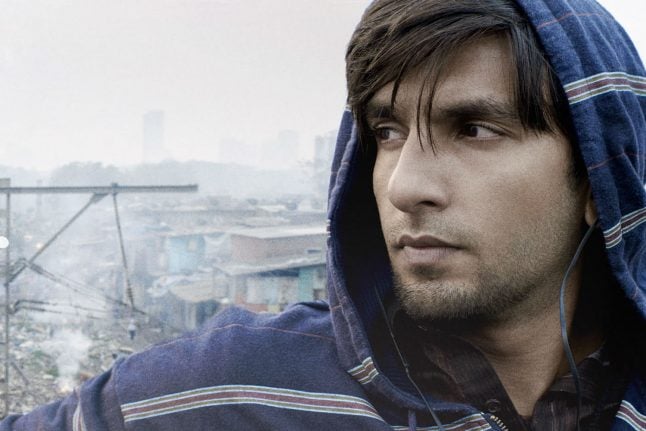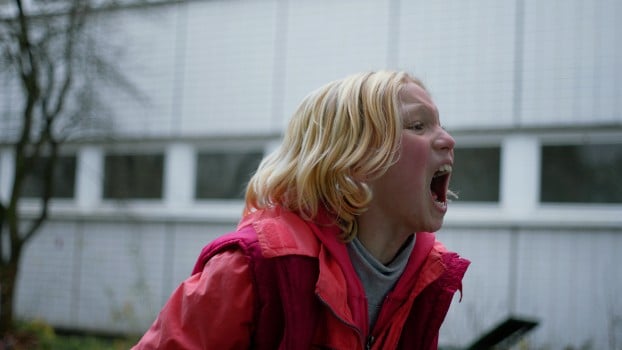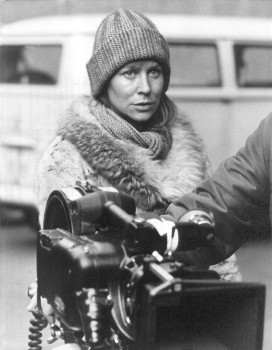The best love stories transcend time, language and class. And the Hindi-language Gully Boy, which fully absorbed my attention for 2.5 hours at the 69th annual Berlinale, was this classic story with a contemporary twist – a tale of two people who overcome the odds to be together, and be themselves.
The film focuses largely on a young Muslim couple – as they are in semi-secrecy since childhood – from Mumbai’s slums who seek to rise above their class and religion-imposed restrictions.
“It’s an underdog story,” director Zoya Akhtar told The Local, near where the film would premiere on February 9th at the Friedrichstadt Palast to a swiftly sold-out crowd, many from Germany’s Indian diaspora. “It’s a story about someone overcoming his circumstances. It’s also a story of chasing your dreams, which is a universal theme.”
SEE ALSO: Berlin film fest rolls out red carpet for women trailblazers
The main protagonist, the 22-year-old Murad (Ranveer Singh) aspires to be a hip hop artist, and his girlfriend Safeena (Alia Bhatt) is studying to become a surgeon, even though her parents’ biggest plan for her is an arranged marriage.
The strong-willed Safeena has a fierce temper, but also uses it to encourage Murad. “If something good comes along, shut up and take it,” Safeena says to him in one scene.
But that’s not always easy. Murad lives squeezed into a small and squalid space with his mother and abusive father, who forcefully forbids Murad from practicing his craft.
“The more and more you see those conflicts, the more and more you start rooting for him,” producer Ritesh Sidhwani told The Local. “So by the time you see him succeed, you’re so invested in him you’re like, ‘Oh my god, I want to see something good happen.'”

 Alia Bhatt with a fan of Gully Boy at its Berlin Premiere. Photo courtesy of Sunny Malik.
Alia Bhatt with a fan of Gully Boy at its Berlin Premiere. Photo courtesy of Sunny Malik.
Cutting through taboos
The film tackles several taboos, with ripe commentary on India’s class divide, and a host of strong female characters. In an unusually daring move, Murad’s mother leaves her husband when he takes a second wife.
The tension in Murad’s life – both personally and what he observes when working as driver for Mumbai’s jet-setting rich – also fuels his fervent lyrics.
When attending a beats battle for the first time, he simply seeks to pass on the poetry he’s penned to his local rap idol Sher (Siddhant Chaturvedi), hoping the local star artist will incorporate the lyrics into one of his beats.
But Murad finds himself in centre stand when Sher encourages him to voice those words himself. His true talent – both for poetry and performance – stun the seasoned crowd, who hadn’t expected much from the cautious newcomer.
It is also Safeena who enables Murad, giving him the tablet that he uses to watch local hip-hop he admires, and record his own. Putting his YouTube videos online is what captures the attention of many fans, including Sky (Kalki Koechlin), a wealthy white woman who he sees as his ‘in’ to the music industry.
When Safeena and Murad briefly break up, he becomes closer with Sky, only to realize that letting go of Safeena is like “being without a childhood.” Despite Murad’s meteoric rise to fame by the end of the film, Safeena is the faithful force that keeps him grounded.

On the set of Gully Boy. From left to right, Kalki Koechlin, Ranveen Singh and Zoya Akhtar. Photo courtesy of Sunny Malik.
Akthar says she purposes chose a diverse range of characters to represent the population of Mumbai, a massive metropolis of 18.5 million people.
“We have people from all over which coexist,” said Akthar. “Their narratives cross each other, and in a very interesting way, you know. Your world touches upon so many identities.”
Yet while she was previously “a huge fan of hip-hop,” says Akthar, “I’ve always engaged the artists which is mainly American and British. And I hadn’t liked the rap scene in India.”
That all changed when she saw a video in 2014 by hip-hop artist Naezy, who inspired the film. “He was completely legit, his writing style was fantastic,” said Akhtar, one of the few big-budget women women directors in Bollywood.
It was then she learned about the phenomenon of Gully Rap – gully meaning street or lane – which has given a voice to urban youth like Naezy who aren’t typically represented in the mainstream, said Akhtar.
SEE ALSO: Berlin film fest turns focus on women, Netflix
A break-out film
The production of Gully Boy – which had its worldwide release on February 14th, itself breaks taboos, being both a rare blockbuster directed by a woman, and a Hindi film with a heavy and honest look at social themes, including with a sometimes non-verbalized expressiveness in its characters that capture their nuances.
“I think it’s important to not tell the viewer everything, which is what Hindi cinema tends to do,” said Akthar. “We tend to over-explain, we tend to cover all corners so that people can understand, so that they can hear. But people don’t need to see everything.”
SEE ALSO: European films out of picture for Berlin’s golden bear
Singh, a huge hip-hop fan himself, spent nine-months training to perform the original songs seen in the film – and surprised the premiere’s packed audience in Berlin with an actual performance following the screening.

At the premiere of Gully Boy at Friedrichstadt Palast: Ranveer Singh, Alia Bhatt, producer Ritesh Sidhwani and director Zoya Akhtar. Photo courtesy of Sunny Malik.
The screening had quickly sold out, with many tickets snatched up by a handful of the 100,000 Indians living in Germany, or 175,000 Indian descendants. Bhatt herself has German roots: Her grandmother Gertrude Hoelzer lives in Berlin, and Bhatt has said she feels an emotional connection with this city. Her grandfather fled to London during the Nazi era after two years in prison for publishing an underground newspaper.
The movie was one of a growing number of non-European highlights at the Berlinale – the world’s biggest film festival with 400 films – and a growing number which come from women directors.
Gully Boy nears its end with an hip-hop battle to be the opening act in Mumbai for US rapper Nas, who served as an executive producer on the film. Safeena is among those who eagerly look to the stage as Murad awes the crowd with his confidence.
With energy and exuberance, and repeats that “Apna time aayega (my time will come).”
Official video for the song “My time will come” from 'Gully Boy.'




 Please whitelist us to continue reading.
Please whitelist us to continue reading.
Member comments